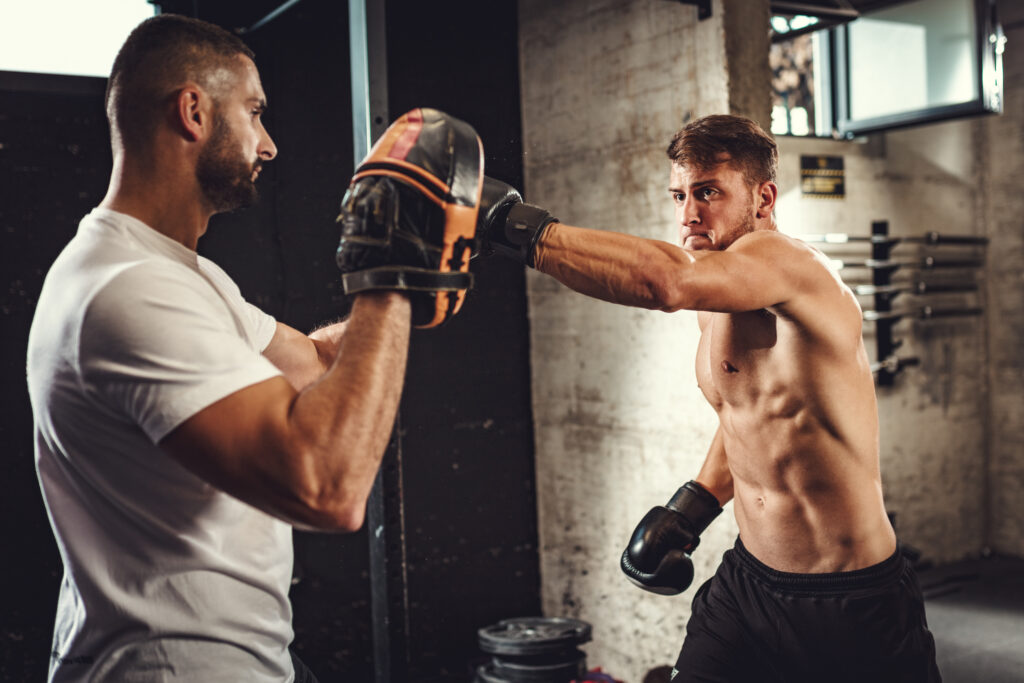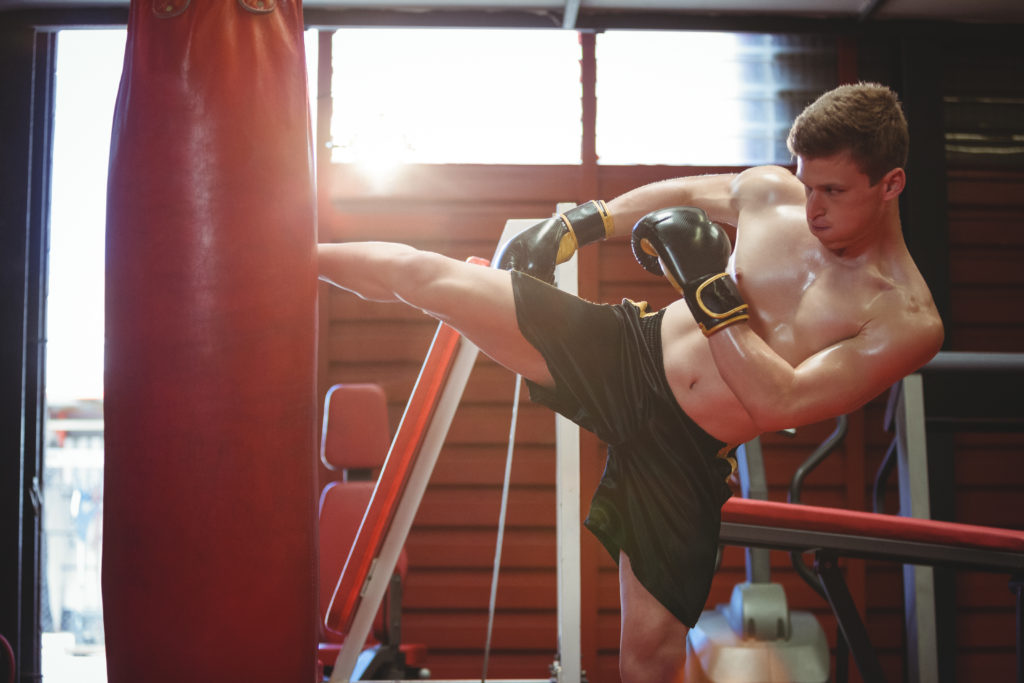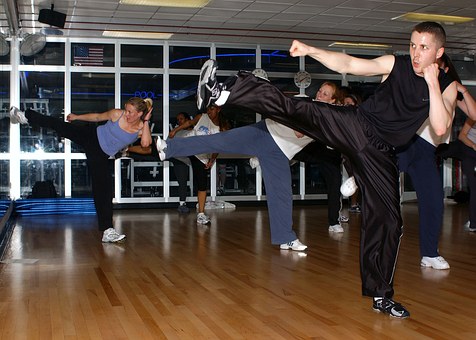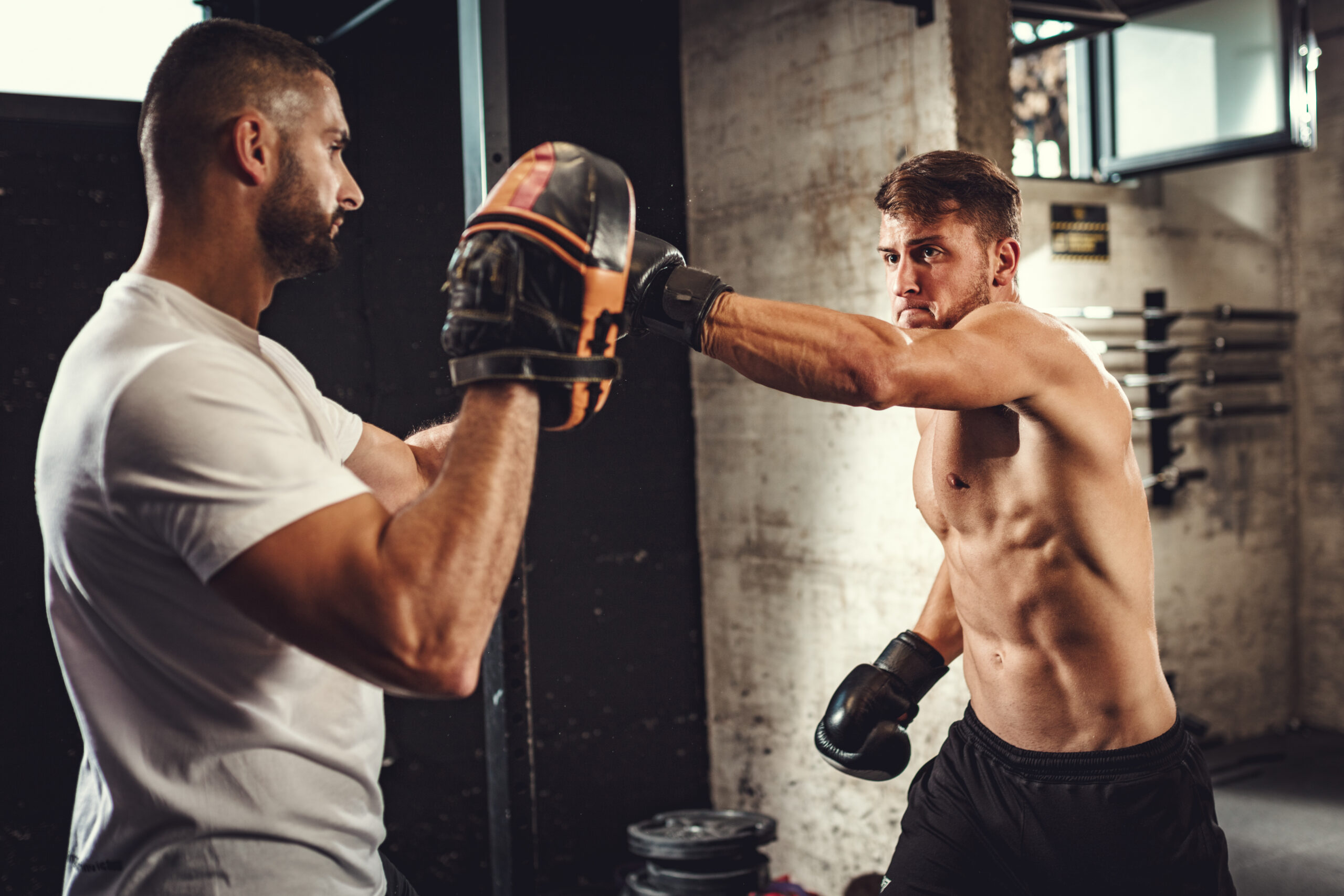If you are starting up or getting back into a fitness routine or martial arts training, then you might be considering a full body workout and martial art like kickboxing.
But does kickboxing build muscle? Does kickboxing tone your body? Will kickboxing make you skinny or bulky?
Kickboxing can build some muscle.
However, kickboxing training in general is more likely to result in a toned physique rather than one that is heavily muscular or bulky.
For someone trying to lose weight (i.e has high body fat) or someone trying to gain weight, kickboxing can and will help build small amounts of muscle.

But to develop a bulky physique with large amounts of muscle, genetics and resistance training, mostly in the form of weight training is still probably the best method.
In this post we get into the striking style of kickboxing and how it has become increasingly popular not only as a combat sport and martial art, but also as a form of weight loss exercise i.e ‘cardio kickboxing’.
Kickboxing can help build some muscle due to the nature of training, but if you worry that kickboxing will make you look too muscular you don’t have to fear this happening.
Can I gain muscle with kickboxing?
The answer is, yes, you can gain some muscle with kickboxing.
This is especially is you are new to physical training and fairly intense exercise.
If you are overweight with high body fat or are quite skinny/slim with not much muscle, kickboxing can definitely help you to gain muscle.
Especially in the early stages of taking up kickboxing.
But, developing a larger, heavier muscular physique will require weight training and a high calorie diet and probably will not be developed through kickboxing alone.
This is because kickboxing is a highly aerobic physical exercise and burns significant calories each training session which makes it difficult to build large amounts of muscle through kickboxing training alone.
Kickboxing will increase strength but maybe not body composition
Even though kickboxing may not develop large muscle growth, it is still effective for strengthening the body.
A 2014 study by the Muscle, Ligaments and Tendons Journal on the effects of five weeks of kickboxing (1 hour sessions 3 days per week) training on physical fitness found significant improvement in upper-body muscle power, speed and agility.
However the same study also saw no changes in body composition after the five weeks of kickboxing training.

This likely means the participants did not gain muscle or lose fat to a degree that resulted in body composition changes.
However it should be noted that the above study only looked at body composition (muscle gain/fat loss) over five weeks of training and that it is very possible and likely that longer periods of consistent kickboxing training (3-5 sessions per week) will yield better body composition results.
Especially in terms of fat burning but also lean muscle even if only small amounts.
Kickboxing can Tone Your Body – Get Ripped
Picture the physique of an elite kickboxer, an a lean, muscular physique normally comes to mind.
There are definitely very muscular kickboxers such as, Alistair Overeem and Malvin Manhoef (the Mike Tyson of kickboxing – check out the video below) among many others.
But the general kickboxing physique tends to be associated with low body fat percentage, ripped abs and ‘lean muscle’.
A 2017 study by the Biology of Sport Journal found that both amateur and elite-level male kickboxers are physiques are a higher proportion of “mesomorphy” with well-developed muscle mass and low body fat percentage.
While it is definitely true that those with naturally strong physiques, due to their genetics or training from quite a young age, are the ones who are more likely to become elite-level kickboxers.
It can also be argued that the nature of kickboxing training itself helps to develop and maintain a muscular, ripper physique.
Kickboxing Training Can Build Muscle & Burn Fat
Kickboxing is able to developed a toned physique with low body fat percentage and well-developed (not massive) muscle mass due to the nature of training and competing.
Kickboxing training is meant to prepare a person to compete and thus many aspects of physical fitness (including body composition i.e fat versus muscle levels) as well as skill and technique need to part of training sessions.
Kickboxing training and competition involves cardiorespiratory endurance, muscular strength, muscular endurance, flexibility, speed and agility.

Similar to other combat sports, the training is such that both the aerobic and anaerobic systems are worked as well as muscular endurance and muscular strength which all will help to burn fat and maintain (and build to some degree) muscle.
A 1995 study from the Journal of Strength and Conditioning which looked at the physiological profile of kickboxers shows that kickboxing includes high-intensity movements during rounds, with short breaks that are not enough to provide a full recovery.
And also that kickboxing requires moderate-to-high levels of aerobic/anaerobic power.
This shows that kickboxing – or at least training for and competing in high level kickboxing is not just aerobic exercise.
This is unlike certain form of ‘cardio kickboxing available’ today.
Kickboxing Training vs Cardio Kickboxing
It could be argued that either form of kickboxing, combat sport kickboxing training or ‘cardio kickboxing’ can be effective for weight loss.
‘Cardio kickboxing’ can and has produced many great testimonials in terms of weight loss.
‘Cardio kickboxing’ is lower impact but very excellent aerobic (mostly with anaerobic elements too) activity for weight loss.
Together with resistance training and a weight loss eating plan, you can get great results in terms of fat burning and body recomposition.

Cardio Kickboxing & Weight training
Can ‘cardio boxing’ help build muscle. Will ‘cardio kickboxing’ help gain muscle.
‘Cardio kickboxing’ alone will not help too much with gaining muscle as the activity is mostly aerobic and lower impact (less heavy striking and no contact).
But together with a smart weight training plan a person can still gain muscle while doing ‘cardio kickboxing’.
It would be wise to limit your cardio kickboxing to 2-3 sessions per week if muscle gain is a main goal.
Kickboxing – Combat Sport Training
You can train like the pros if competing and fighting are not your main goals.
But if you still want to gain muscle while training as pro kickboxers train, you will need an even ‘smarter’ weight training program.
This is because combat sport training is very intense with:
- heavy striking (punching and kicking the bag, pads)
- sparring
- calisthenics (pushups, pull ups)
So if muscle gain while kickboxing training is a goal then only the most vital weight training exercises and routines should be used to get maximum effect without expending too much energy which should. be used for kickboxing training and recovery from kickboxing training.
This is if you are competing but also want to gain muscle, perhaps to move up a weight class.
Weight training is done even by high level professional in combat sports because of the strength and conditioning benefits that can’t really be gained with other forms of training i.e other than weight training.
Does Kickboxing Build Muscle? Wrap Up
Kickboxing training can help build muscle due to the nature of the training.
Because kickboxing is anaerobic with proven improvements in speed, strength, agility and muscular strength and endurance, it is very possible to build a little muscle with kickboxing training.
This is especially so if you have not done any exercise at all for a long time or ever or you are out of shape and are getting back in shape.
Through kickboxing training, especially combat sport training rather than ‘cardio kickboxing’ training you can gain a little muscle with kickboxing training.
But you will not become very muscular and bulky with kickboxing training, unless you have the genetics or you are also doing weight training outside of your kickboxing.
The most effective way to gain muscle while kickboxing training is to add in a ‘smart’ weight training plan and plan for your recovery and nutrition as well.



